|

VI. TOURISM
The
longest bridge in Southeast Asia, San Juanico Bridge, is known as a symbol of
love by the Waraynons which connects the sister islands of Samar and Leyte.
A. Tourism Spots
Samar province has her share of
nature's bounty. Among the nature's jewels which enchantingly lure tourists and
local folks includes unexplored mountains and caves which are inhabited by
exotic wildlife, pristine shores rimmed by unspoiled coral reefs, cloud-hidden
lakes of blue surrounded by multi-colored flowers and beautiful beaches and
waterfalls nestled beside a mountain. Here are some of Samar's beautiful spots.
▪
Sohoton National Park
|
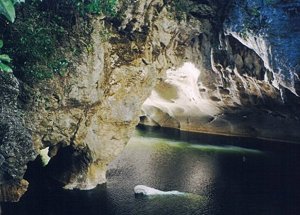
The Sohoton Natural
Bridge of Basey, Samar |
The park is situated at
Rawis, Brgy. Guirang, Basey, Samar covering an approximate area of 840 hectares. Fascinating
geological features abound in the area of the national park such as caves, hugs,
limestone boulders, rockholes, weathered formation rocks and underground rivers.
The most prominent
assemblage in the park is the cathedral-like caves, which are the Panhulugan I,
and II, Sohoton and Bugosan. All the caves in the park are endogen caves in
angular limestone cliff, which support the base of other crack system. It
abounds with flowstones and dripstones. Two and a half (2.5) hours motorboat
ride from Tacloban City and two (2) hours ride from Basey proper can reach these
tourist spots in Basey.
▪
Sohoton Natural Bridge
A fantastic huge
arch-shaped rock that connects two mountains ridges spanning the Sohoton River.
It has a vertical clearance of 23 feet, about 8 meters in width and 40 meters in
length. The Stone Bridge is forested at its upper portion while on its
underside hang heavy karst formations of giant stalactites forming like swords
and rockets. This is located within the Sohoton National Park
in Basey.
▪
Panhulugan Cave 1
This cave frames itself
in an angular limestone cliff forming a letter "H" where its three (3) main
cracks serve to wit its form, its two (2) parallel legs lying 50 meters apart
and connected at the entrance by a perpendicular crosspiece. The cracks serve
to be the hub opening for internal hallways. All portions of this cave are
geologically active as evidenced by the constant drips of water from
stalactites. The internal cave chambers measured some 49.2 feet high at the end
of its leg. Its cathedral immensity contains a mismaze interior that branch out
into many multi-leveled chambers and tunnels with an infinite variety of
flowstones and rock formations resembling some familiar images of the outside
world ranging from miniature of famous tourist spots. It is located within the Sohoton
National Park in Basey.
▪
Panhulugan Cave II
|
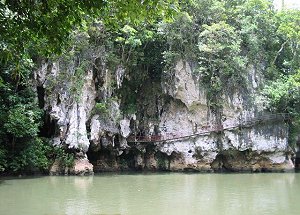
The Panhulugan Caves was
used as burial disposition during the 13th century. |
The cave resembles a
scar formed by a rock shelter around 164 feet (50 meters) in length and 16.4
feet (5 meters) in height. It is also topographically divided into four parts:
Areas, A, B, C and D. Snow-white glittering stalactites of various symmetry
hang from the cave's ceiling, while the brownish to grayish stalagmites seem to
grow endless on the cave's floor. Also located within the Sohoton National Park
in Basey.
▪
Sohoton Cave
The Sohoton cave is a
cathedral-like dome with an entrance of a parabolic arch-type for about
fifty-meters high. It has a flat door area near the entrance, about twenty (20)
meters in width and fifty-meters in length. On its ceiling hangs spike-shaped
crystalline stalactites and rustic and cavernous walls and stalagmites on the
cave's floor. At the far end of the cave are a prince-like window and a balcony
overlooking the natural swimming pool below. Also located within the Sohoton
National Park.
▪
Panhulugan Cliff
Panhulugan Cliff is a
high and steep rock formation directly across Panhulugan Cave I. Down this
towering cliff is a narrow curve of the Sohoton River wherein passing bancas are
dragged during low tide. The name Panhulugan is from the waray-waray word
"hulug" which means to drop from atop. Filipino rebels had used this cliff as
an ambush area during the Filipino-American war. Also located within the
Sohoton National Park.
▪
Bugasan and
Kapigtan Caves
Found also within the
Sohoton National Park are the Bugasan and Kapigtan Caves. These are smaller
caves compared to Sohoton and Panhulugan caves. The only difference of these
caves of the that to Sohoton is the presence of concavities where ancient
remains had been found dating to the Stone and Iron Age period.
▪
Ruins of 15th Century Church
|
 |
|
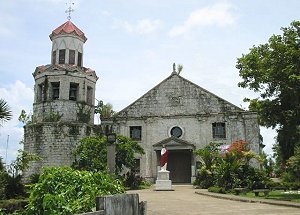
17th century old church of
Basey, Samar |
This is a landmark of
the 15th century church found in the mountain of Barangay Dapdap,
Tarangnan, Samar. This was also called "Tinago Church", being a hideout of
Spanish missionaries.
▪
Basey 17th Century Church
The church stands as a
historical landmark of Basey.
▪
Bangon Falls
Bangon Falls is one of
the most beautiful and spectacular scenic spots worth visiting in the province. From Brgy. San Jaoquin, Tinambacan district, where Lologayan Falls is located; it
will take an additional 20 minutes ride to reach Brgy. Tinaplacan and
another 30 minutes walk to the vicinity of the falls. Following the stream
by ascending to the upper level, one will be amazed to see a circular pond of
about 30 meters in diameter, wide enough for swimming and deep enough for
diving. The water that falls from above seems to come from an endless
stream which flows a swirling path around the falls resulting from the pressure
of its disgorge becoming even bigger in volume and noticeable as the time of the
day passes. It is not only a tourist spot but also a potential source of
power to serve the city of Calbayog and its neighboring localities.
▪
Malajog Beach
Stretching about 200
meters long of grayish sand and cold blue waters with towering rocks at its
south and three (3) beachfront balconied cottages. The resort gives a south sea
island touch and is frequently visited by metropolitan VIPs, movie stars and
foreign dignitaries. It is one of the most beautiful beaches of Samar Island
located in Brgy. Malajog, Tinambacan district of Calbayog City.
▪ Lo-ok Beach
This beach resort is most often
visited due to the accessibility of the place. It can be reached by a 30-minute
ride from Calbayog City and 10 minutes from Tinambacan District. Its white sand,
blue waters, swaying palm trees, towering rocks and concrete rest houses give
the spot a "South Seas Island" touch. What is most inviting is the cool water,
which is different from other beach resorts.
▪
Tinago-an Cave
This cave is situated at
the edge of Brgy. Longsod, Oquendo district of Calbayog City. The cave has been
the main attraction for picnickers desiring to get the rare thrill and
excitement of having a trip through nature-made dark tunnels. The cave made a
name for itself when it was made a hideout by two men wanted by the guerrillas
who hid in it for nearly two years and coming out at night in search for food.
Hence, the name "Tinago-an" means hiding place.
▪
Mawacat Slide
Mawacat Slide is an hour
ride from the Calbayog
City proper to Brgy. Mawacat, Oquendo district and a 20-minute walk thereafter
along a foot trail, shaded by lined tall trees. It is a natural spoon-like
formation, which inclined more or less by about 45 degrees and stretching a
length of about 50 meters. Water flows along this giant cistern and from the
top, one can slide through the mossy lane to the cool inviting pool below.
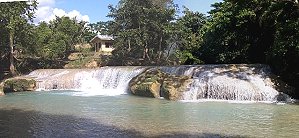 ▪
Blanca Aurora Falls ▪
Blanca Aurora Falls
A bathing
resort mostly favored by Samareños, which is found at Brgy. Blanca Aurora,
municipality of San Jorge.
▪
Pan-as Falls
Pan-as Falls is located
at Brgy. Pilar, Oquendo district and is surrounded with the mighty stands of
rare timbers and wildlife that abound in the area. An hour drive from the Calbayog City proper and a 30-minute hike from the village can easily visit the
place. Seen from afar, it is like a long constructed boat by the mountainside
and at a close up, a series of long drop of crystal water to another. At places
where the cataract is quite high, the falling of water into the pool below
becomes a mere mist because of its high elevation. It is the source of water
supply of the city populace.
▪
Ton-ok Falls
The scenic view of the
waterfall is vividly illustrated through the boulders that rise and water falls
in a series of cataract-like steps from down below to the topmost section of the
mountain. Nature has placed it within easy reach to compensate and preserve its
beauty. Located in Brgy. Sigo, Oquendo district the place can be reached by a
40- minute drive from the Calbayog City proper. The Mini-Hydro Electric Power
Plant is also located here.
▪
Lologayan
Falls
A series of towering
altars of rugged stones wherein between its depression, flow the ribbon-like
cool water which according to old folks, cleansed the hair of a legendary lady.
The term "lologayan" came from the waray-waray root word "logay" meaning to unfold
a braided long hair. Thus, this term probably came from a legend of a maiden
who frequently visited the place to rinse her long hair. To the site is an hour
ride from the Calbayog City proper to Brgy. San Jaoquin, Tinambacan district and
a 10-minute hike onward. This falls is also a source of potable water for San
Jaoquin folks.
▪
Mapaso Hot Spring
As the name suggests,
"mapaso" (literally means hot) is a hot spring with the consistency of boiling
water. Nature has given its life in the form of fresh crustaceans (pokot) with
a tainted pink-red appearance, which ordinarily resembles the tint of a scalded
shrimp. This is located at Brgy. Rizal II, Oquendo District, Calbayog City.
▪
Darosdos Falls
This falls is
situated in Calbayog City. It is famous for its seven-layered falls and it is a
good source for hydro electric power.
▪
Calbayog Cathedral
|
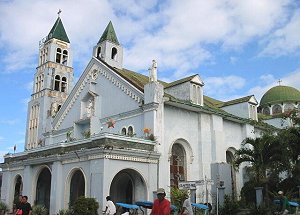
Saints Peter and Paul
Cathedral in Calbayog City |
Saints Peter and Paul
Cathedral that is considered to be the biggest church in all parishes in the
province, seems to have lost its Spanish touch. Nevertheless, the old dome, the
spire and the thick walls reveal the blending of two architectural worlds: the
old and the new historical innovations. Traces of centuries old architecture
could hardly be discerned. Multi-colored walls, niches, domed ceilings, blocks
and tiles are, however, traces of Spanish culture.
▪
Danao Cave
The unexplored Danao
Cave is situated at Brgy. Danao I, Tinambacan district, some 114 kilometers
towards the western coast of the city of Calbayog. It is made up of seven (7)
chambers inhabited by various species of snakes and bats as evidenced by a good
deposit of guano. The cave serves as an initiating hive for those who want to
acquire talisman.
▪
Guinogo-an Cave
Situated at the fringes
of Brgy. Longsob, Oquendo District, the cave is very proximate to Mapaso Hot
Spring and is almost equidistant from the Calbayog City proper. Its cathedral
door size entrance leads one to wade fresh, cool water into a natural tunnel
stretching through, uneven ceiling with some portions touching one's head,
giving the adventurer an eerie trip through the dark cave which can be explored
by carrying lighted torches.
▪
Samar Archeological Museum
The first ever to be
established in the province
of Samar, this museum is one of the vital contributions of Christ the King
College in preserving the rich cultural heritage of the Filipino people. A
collection of many artifacts gathered from all points of Samar Island, the
museum also houses ancient coins, jars, Chinawares, bracelets and beads that
date back to as early as the 14th century. The place can easily be
visited at Christ the King College within
the Calbayog City proper.
▪
Guimit Cave
This is another large
cave full of stalactites and stalagmites, which is situated at Brgy. Mallorga,
Talalora, Samar. It can be reach by one and a half-hour motorboat ride from
Catbalogan.
▪
Obelisk
The Obelisk
features the major historical events of the province which is depicted in the
four sides of the structure: the arrival of the 1st Jesuit Missionaries on
October 15, 1596; Rebellion of Agustin Sumoroy in 1649; Decree of Queen Isabella
on August 11, 1841 declaring Samar as an independent province no longer under
the jurisdiction of Cebu nor Leyte; and, the Samareños Victims of Balangiga
Massacre on September 29, 1901. This historical landmark is situated in front of
the Capitol Building, Catbalogan, Samar.
▪
Kinabut-an Spring
The spring is about 40
minutes ride from Catbalogan by land and is located at Brgy. Patag, Paranas,
Samar. It is a refreshing hideout from the maddening crowd which city and urban
dwellers find alluring.
▪
Ruins of Bangahon
Ruin of Bangahon is a
historical landmark near the right fork of Gandara River. It was once a town
during the revolutionary period, but was abandoned by the old residents who
later found the present town of Gandara.
▪
San Juanico Bridge
One of the popular
bridges nationwide known as "San Juanico Bridge" has the distinction of being
not only the longest bridge in the Philippines but also the longest in Southeast
Aisa. It has a total length of 2.162 kilometers or 2,162 linear meters, the
equivalent of 7,092 feet and having a breadth of 10.62 meters. The highest
point at the main span is 41 meters above the water level. It has 43 spans and
42 piers.
The S-shaped structure
on the Samar side had to be adopted to make use of the importance of the existing islet,
the Cabalauan islet that lies in the middle of the San Juanico Strait between
the two island provinces of Samar and Leyte. This islet serves as resting point
and provides added support to the massive structure soaring over the swift
currents of the strait.
▪
Lulugayan
Falls and Rapids
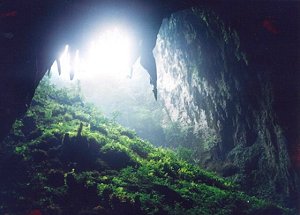
Entrance of the
Langun-Gobingob Cave in Calbiga, Samar |
Nature-lovers likewise
enjoy white water rafting (rapids shooting) a very challenging aqua sports at the Lulugayan falls and Rapids of Calbiga, Samar.
▪
Langun-Gobingub Cave
Spelunkers will surely
enjoy exploring the Langun-Gobingob caves of Calbiga, Samar, said to be the 2nd
largest Karst cave in the world.
▪
Marabut Marine Park
One of the scenic
natural attractions located in the municipality of Marabut, Samar. Marabut
marine park boasts its 15 towering rock islands with secluded beach coves and
coral gardens, perfect for snorkeling, scuba-diving, sun bathing and other water
sports activities.
B. Tourism Facilities
Accommodation can be provided
to tourists coming to Catbalogan, or Calbayog City. Air-conditioned or
non-air-conditioned rooms are available in these establishments.
|
Hotel,
Restaurant, Lodging and Pensionne Houses |
|
Tourist Facility |
Type |
Location |
|
1. Fortune Hotel and Restaurant |
Hotel & Restaurant |
Catbalogan City |
|
2. Fame Hotel |
Hotel |
Catbalogan City |
|
3. Maqueda Bay Hotel and Restaurant |
Hotel & Restaurant |
Catbalogan City |
|
4.
Cell.com Hotel and Restaurant |
Hotel & Restaurant |
Catbalogan City |
|
5.
Rolet Hotel |
Hotel |
Catbalogan City |
|
6. Kalinayan Inn |
Hotel & Restaurant |
Catbalogan City |
|
7. Casa Cristina Hotel |
Hotel |
Catbalogan City |
|
8. JC Food Spot |
Restaurant |
Catbalogan City |
|
9. Tony's Kitchen and Restaurant |
Restaurant |
Catbalogan City |
|
10. SSPC Hostel |
Hostel |
Catbalogan City |
|
11. Rose Scent Pensionne House |
Lodging House |
Catbalogan City |
|
12. Villarin's Bed and Breakfast |
Lodging House |
Catbalogan City |
|
13. Sto. Rosario Pensionne |
Lodging House |
Catbalogan City |
|
14. Traveler's Lodging House |
Lodging House |
Catbalogan City |
|
15. Summers Garden Pensionne |
Lodging House |
Catbalogan City |
|
16. Central Inn and Restaurant |
Hotel & Restaurant |
Calbayog City |
|
17. San Joaquin Inn and Restaurant |
Hotel & Restaurant |
Calbayog City |
|
18. Seaside Drive Inn and Restaurant |
Hotel & Restaurant |
Calbayog City |
|
19. Eduardo's Tourist Hotel |
Hotel |
Calbayog City |
|
20. Riverside Hotel |
Hotel |
Calbayog City |
|
21. TTMIST Hostel |
Hostel |
Calbayog City |
|
22. Sangyaw Lodging House |
Lodging House |
Calbayog City |
|
23. Princess Pensionne |
Lodging House |
Calbayog City |
|
24. Wayside |
Lodging House |
Calbayog City |
|
25. Carmelo's Restaurant |
Restaurant |
Calbayog City |
|
26. Marju-Krisel Hotel and Restaurant |
Hotel & Restaurant |
Calbayog City |
next►►
Samar Festivals
|